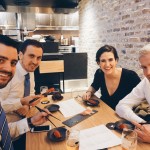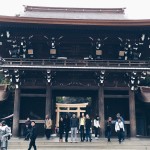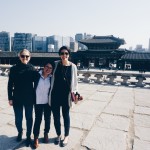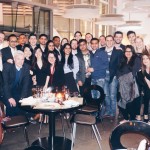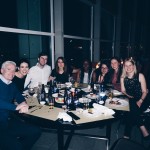The Smurfit School at University College Dublin takes an annual study trip. This year I was one of seventy MBA students to visit Tokyo and Seoul. The group included full-time and executive MBA students, most of whom were Irish. Our tour included stops at the Irish embassies in both cities, discussions with Enterprise Ireland, as well as general company visits.
It was a unique experience visiting these countries as part of a delegation from Ireland, not from my home country. While I’ve lived in Ireland since August, and feel part of the MBA community, my passport still reads USA. My perspective is directly linked to my being an American and having work and educational experiences in the United States. Traveling with the Smurfit group gave me an opportunity to experience Tokyo and Seoul through a different lens. Even though I was thousands of miles away, the trip helped me better understand Ireland too.
One area that struck me the most is how global the Irish economy is. The Irish students I travelled with, some who are students while also working full-time for Irish companies, looked at business in an almost borderless way. They were acutely aware of new technologies being developed around the world. They asked questions about how Ireland does and could encourage more foreign direct investment. They wanted to learn how to apply business principles being used in Japan, Korea, or Asia more broadly to the work they were doing now and in the future. Foreigners unfamiliar with Ireland may jump to thinking of the Irish economy in agricultural terms, rooted in traditional businesses, or having a provencal flavor. But my classmates reminded me how global, tech-savvy, and forward-thinking Irish businesses are.
Ireland’s neutrality was also uniquely apparent on the trip. I imagine visiting that part of the world with a group from the United States, particularly South Korea, would mean a noticeable focus on diplomacy, military relationships, and foreign policy. The link between government and business, or business and international affairs, would have likely featured prominently. But my Irish classmates seemed less focused on those elements. I imagine that may be because Ireland has a strong emphasis on neutrality and doesn’t have the history or military and diplomatic involvement in the region that the United States does. It also may be due to the fact the links between business and government aren’t as central in Ireland as they are in the United States. Discussions and questions took different directions being in an Irish group than they may be been with an American group. I appreciated those differences.
Departing Asia with my Irish peers left me thinking about where there were similarities and differences between the three regions — my home in the United States, my current home in Ireland, and the places we visited in Asia. All are connected through an increasing global, networked, and mobile business environment. All rely on one another in various ways — for investment, diplomatic support, collaboration, trade, and human capital. All have specific strengths that they can share with and learnings they can borrow from others countries.
I spent St. Patricks day in Seoul with a group of Irish students and other MBA classmates from different countries. That day in particular was a reminder of so many things I’ve loved about living in Ireland — welcoming hospitality, ability to find and share fun wherever with whomever, and a diaspora that has brought Irish culture to every corner of the world.
Also… fear not. You can find an Irish pub and a pint of Guinness even in Seoul, 8,946 kilometres from Dublin.
- A new perspective
- Sushi with Irish classmates
- A temple in Tokyo
- Exploring Seoul
- Smufit full-time MBA students.
- You can find an Irish pub in every corner of the world!
- MBA classmates at our closing dinner
- Visiting Asia with University College Dublin


